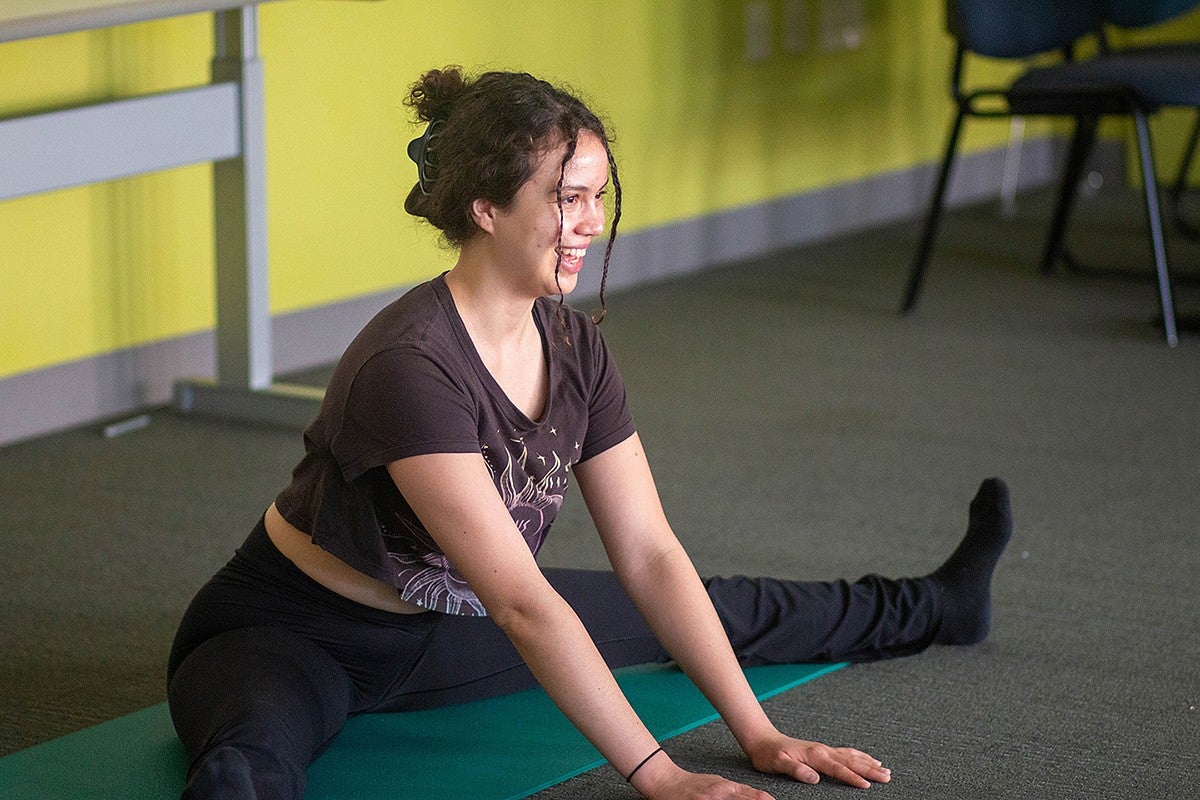
Listening to her purpose
In a cool, dim room in Straub Hall, five supine yogis breathe slowly, hands resting on their bellies. The warm spring day outside is bright and inviting, but a soft voice anchors them on their mats. “I know there are lots of other places you could be right now,” the voice says. “It’s OK if your thoughts go elsewhere – just gently bring them back.”
It belongs to Neive Wellington, a Clark Honors College senior and the teacher of this free yoga class. She invites the students to set an intention, in the form of a question: “What brought you here today?”
For Wellington, the answer to that question is her passion: to offer community programming in wellbeing, yoga and sports. After graduating with a degree in advertising and minors in entrepreneurship and global service, she’ll pivot away from “selling companies’ stuff” toward creating community around the physical and mental practices that have sustained her through her time at the UO and helped her stay true to herself.
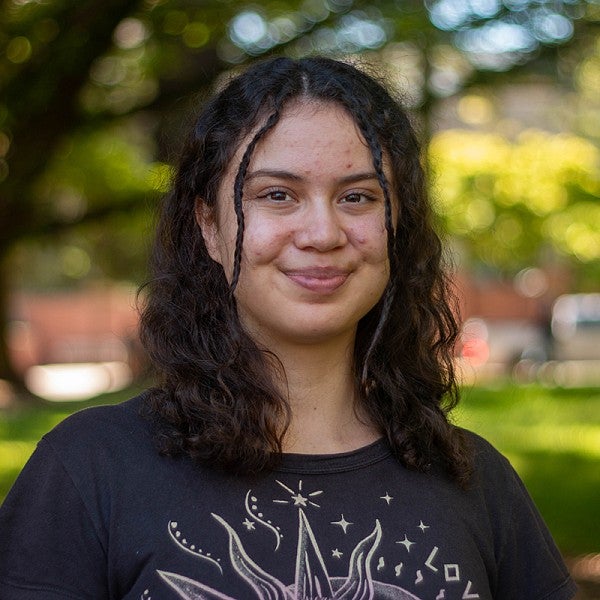
Neive Wellington
Major: Advertising
Minors: Entrepreneurship and global service
Thesis: “Inner Peace for Sale: The Commercialization of Yoga in the Western Wellness Industry”
Coffee or tea: Coffee
Describe your experience at CHC: Challenging, but rewarding
One decision that made all the difference: Studying abroad (times two)
Advice on the thesis project: Seek feedback from a variety of perspectives.
Advice to incoming first-year students: Follow your interests both in and out of the classroom.
This summer, I can’t wait for: Beach days
What I’ll miss most about CHC/UO: All the different PE classes. Backpacking and MMA were my favorites.
I’m grateful for: Everything I’ve learned over the past four years.
Where I’m headed next: Back home to California for the summer, and then Barcelona for a master’s program in September.
“I feel very passionate about the benefits of yoga, and being an advertising major, I’ve realized it’s really misrepresented in Western media as a fitness practice,” she says. “A lot of the history and spiritual aspects of it get kicked to the side.”
Yoga’s misrepresentation has irked Wellington enough to inspire an entire thesis project. Hers is titled: “Inner Peace for Sale: The Commercialization of Yoga in the Western Wellness Industry.”
Wellington argues that yoga gets packaged for a certain demographic, when it should be seen as an inclusive activity. “I fit the demographic,” she laughs, “a young woman, White-passing. But I’m really passionate about undoing the narrative that it’s only for that stereotype.”
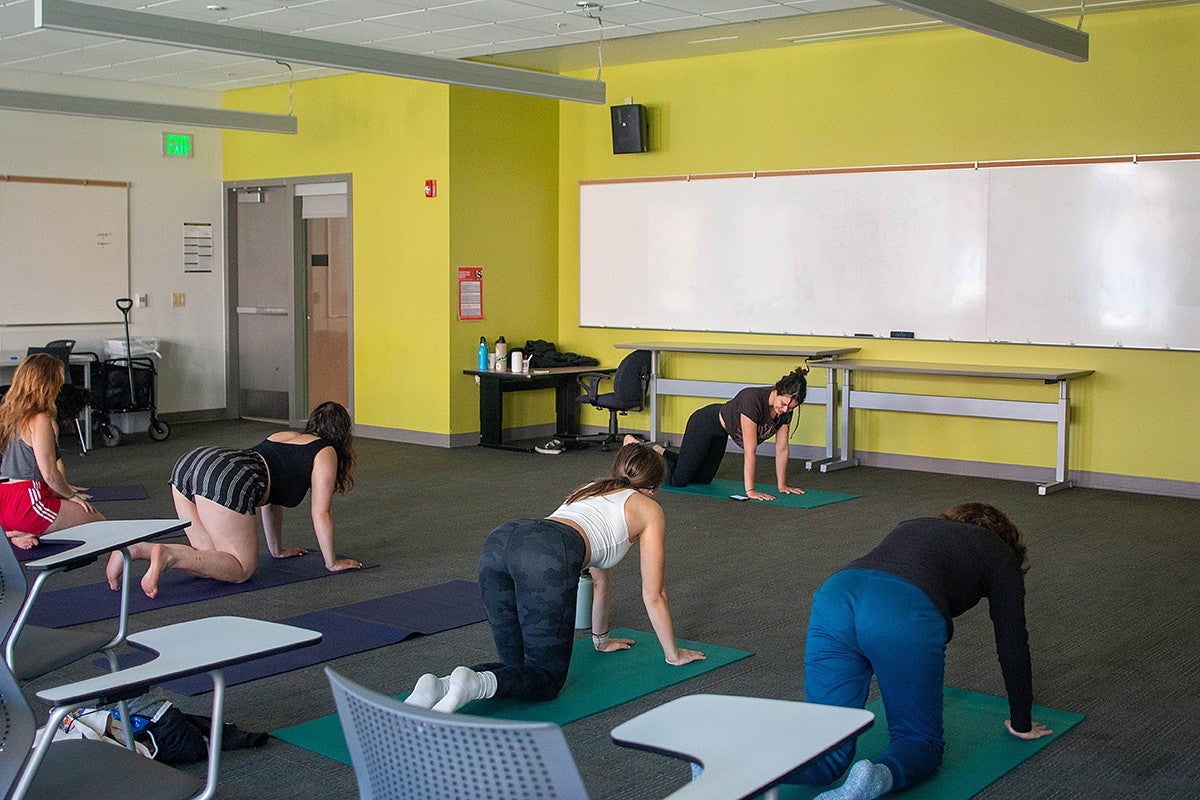
On the UO campus, making yoga more accessible has meant taking it out of the physical recreation setting, said Rachana Patel, a mental health specialist at University Health Services and Wellington’s supervisor at the Duck Nest Wellness Center, which has been offering the classes.
“A lot of our minoritized students on campus don’t access the Rec,” she says, referring to the Student Recreation Center. “So what can we do to break down these barriers for students who are feeling intimidated and not welcome there? Being able to offer a free yoga class to students outside of that building is very important.”
The Duck Nest has been able to offer classes directly to organizations like the Black Cultural Center in its own spaces, and Wellington has valued this teaching experience.“It’s important to make classes as accessible as possible because I believe everyone has something different to gain from practicing yoga,” she says.
This fall, she’ll move to Spain and enter a one-year master’s in sports management program at Universidad Pompeu Fabra’s Barcelona School of Management. She hopes to stay in the city and pursue her purpose of guiding others to a better relationship with themselves.
Staying true to her roots
Growing up an only child in Palo Alto, California, Wellington felt very connected to her Latina identity through her Mexican American, bilingual mother, who took the then five-year old girl to Mexico. But to this day, she jokes about her name sounding like British royalty.
“My name is Neive Elizabeth Wellington – that’s the Whitest name ever, and while it has its privileges, that really frustrates me because it doesn’t reflect half of my identity,” Wellington says.
More privilege came her way via the Palo Alto “bubble” and its top-ranked public school system. School was also competitive, and she was expected to achieve at a high level. Her mom, a Stanford alum with a PhD, was a valedictorian and first-generation college student who grew up working-class in a Central Valley farming town. “I didn’t consider not going to college,” Wellington recalls.
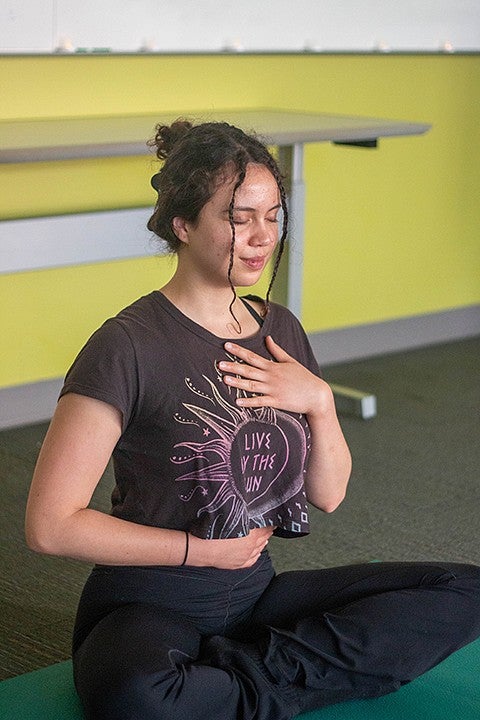
When the academic pressure increased in high school, extracurriculars started to pile up, and the pandemic hit, she knew she needed a way to ground herself.
“I felt very stressed,” she remembers, “and I didn’t have a lot of tools to help me because it was all around me.”
Her senior year, she heard about free yoga classes for students at a local hospital.
“There, I found a space that was free of judgement and expectations,” Wellington says. “I learned to slow down and tune into my body, something that was so opposite from the pace of life I was used to as a busy student. It was during this period that I knew I would continue my practice for life.”
Applying to college, she already knew her interests in advertising, entrepreneurship and Latin American studies matched with UO’s academic programs. But it was the just-right feel of the Clark Honors College that sealed the deal.
“It’s the best of both worlds: small school and classes, with the opportunities and benefits of a big school,” Wellington says.
She quickly realized, though, that despite loving Oregon’s natural beauty, the rainy winters were a huge challenge. During her first year, the 2020-2021 era of isolated remote learning caused by the pandemic, a masked yoga class was one of the few bright spots. “Yoga helped me immensely through the pandemic,” she says.
Wellington also had meticulously planned out her course requirements to make time to study abroad. Her first trip was to Oxford with CHC Professor of Practice Barbara Mossberg, a joyous experience coming out of the lockdown.
The literature theme of the program wasn’t related to her major, but that’s part of what Wellington loves about the CHC.
“Since the faculty have free rein over what they teach, they focus on what they’re passionate about, and that really reflects in the quality of the class ... Even the classes that weren’t as interesting to me, I still found value in them,” she says.
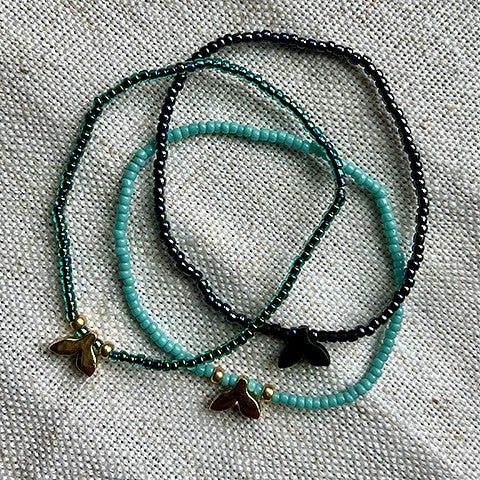
For instance, Wellington fulfilled a science requirement with “Marine Mammals,” taught by instructor and marine biologist Lisa Munger. Though science isn’t an interest of hers, she’s passionate about environmental conservation, and she learned about the vaquita, a small, highly endangered porpoise.
Native to the Gulf of California with a Spanish name translating to “little cow,” the vaquita’s story resonated with Wellington. For the class’s final project, she created porpoise-themed jewelry to raise money for an organization working to protect vaquita.
“The flexibility of assignments allowed me to really put my heart into the project,” she says. “That’s not something I’ve experienced in other classes.”
Sophomore year presented Wellington with a health challenge that affected her eating, sleep and mental equilibrium. She had to back off her commitments to take care of herself as she tried to heal chronic digestive issues, and being isolated from her communities was hard.
“I was really sad that year,” she says. “I learned I need to stay busy to be happy, and that I need more sun. Now, it’s valuable to know that about myself.”
It was around this time Wellington began volunteering at the Duck Nest as a peer wellness facilitator. This involved presenting resources to campus groups or classes about stress management, sleep hygiene and more. The next step on her journey of self-discovery would come on her second study-abroad trip.
In search of sun
“Going into college, it was my dream to study abroad in Barcelona,” says Wellington, “and it surpassed my expectations. I had never felt so happy.”
Wellington traveled there in fall of junior year on an exchange program in advertising and media at Blanquerna School of Communication and International Relations. Taught in English, the program included students from around the world. The cultural diversity in the sun-baked Mediterranean city was a revelation for her.
“I realized that’s the environment I thrive in,” she remembers thinking. During her time there, her digestive issues also cleared up.
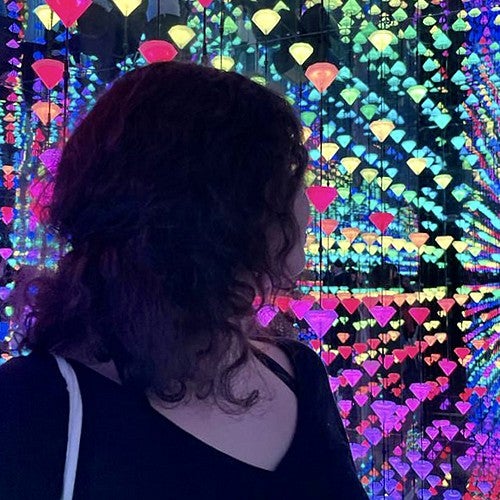
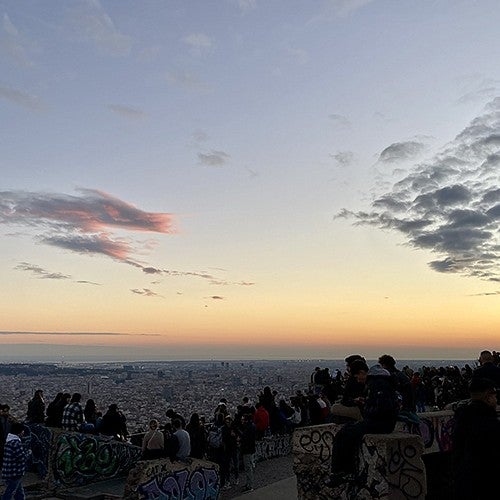
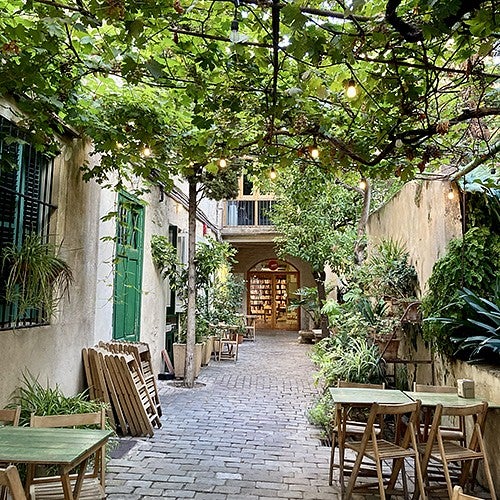
After the semester ended, Wellington stayed on in the city to earn her 200-hour yoga teaching certification at a studio called Yoga Weeks. When she returned to the UO campus last spring, she asked the Duck Nest if she could offer yoga classes there on a volunteer basis.
“I was very nervous coming right out of the certification,” she recalls, “and I thought, this is a low-stakes way to start teaching.”
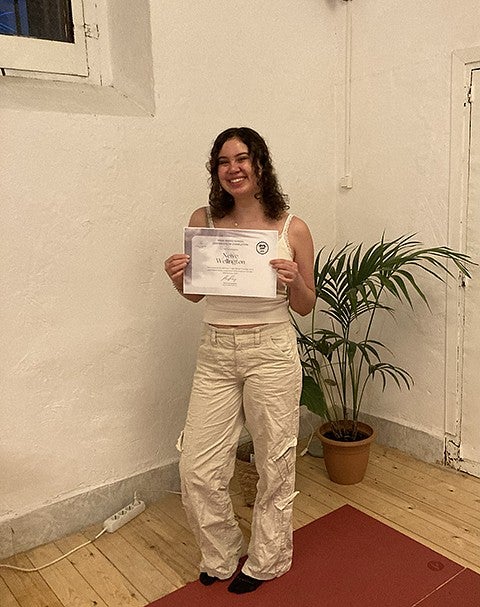
At the time, no yoga program existed at the Duck Nest. Because of the center’s focus on inclusive community through mental and physical wellbeing, Patel asked that Wellington emphasize both the psychological benefits and the cultural roots of the practice. The resulting classes were a natural outgrowth of Wellington’s work.
“She has this genuine desire to support her peers, and that makes her even more ideal to be the one leading our yoga classes,” Patel says.
Coaching with intention
A new opportunity to support other students arose in Wellington’s junior year with the Well-Being Coaching program in UO’s PE and Recreation Department. She was in the first cohort of trainees in a three-credit course, through which she earned a health coach certification.
Wellington worked one-on-one with other students to help them achieve their wellbeing goals through stress management, sleep, healthy habits, setting boundaries, and other aspects of self-care.
Jessica Campbell, the department’s senior assistant director of fitness and wellbeing, first introduced the free program on campus. Campbell says Wellington brought strengths like active listening and empathy to the work.
“As a well-being coach, you are guiding the conversation,” Campbell says. “But really (you are) letting the client speak to the strengths that they already have, and what they want to work on. It takes someone like Neive—who is a really good listener—to follow up with intentional, empathetic, open-ended questions and help them reflect, debrief and encourage them through the process.”
After an initial session, Campbell saw Wellington following through with support for her peers, too. “She’s not someone who clocks out and checks out,” Campbell adds. “She’s consistently available to people to help them, which I think shows her deep care for others.”
Wellington wants to spread the word about the program’s benefits. “I’ve seen a lot of people find immense value in it,” she says. “My dream job is basically what Jessica does.”
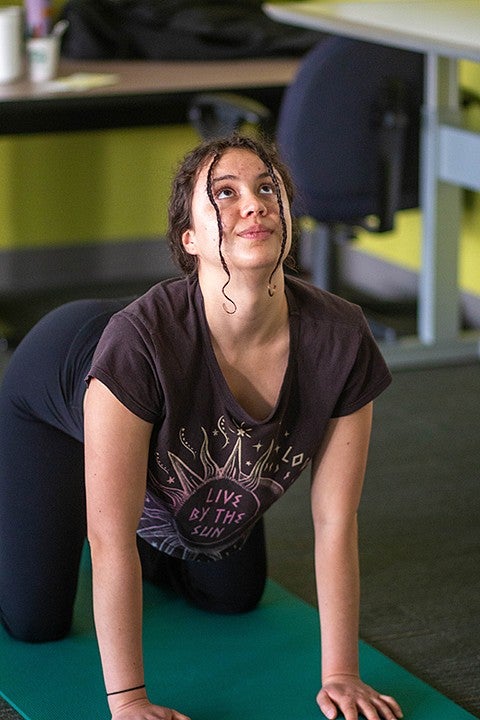
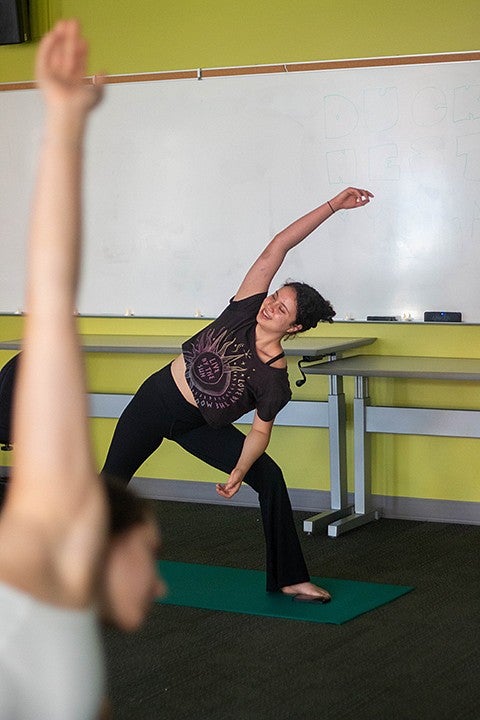
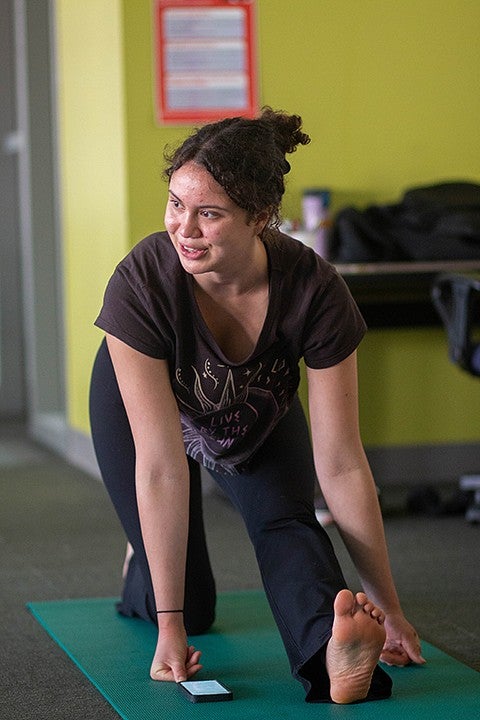
The coaching work has helped her realize she wants to pursue sports management. And she’s also eager to stay in Barcelona long-term after earning her graduate degree. “I left Barcelona knowing that I wanted to move there,” she says.
The program will end with an internship, and through that opportunity, she aims to make as many connections as possible as she charts out her career path. Regardless, she’ll follow the advice she always gives: to stay focused on her intention.
As the yoga class nears its conclusion, Wellington sits cross-legged at the front of the room, guiding the students through their final meditation. A bell chimes somewhere on campus, and piano notes drip through the speaker as students lie with toes pointed upward, eyes closed.
“There is nowhere else you need to be right now, nothing else you need to do,” Wellington tells the students. “Relax and enjoy the benefits of class today.”
After a few minutes, she gently leads them up into a seated position and leaves the class with a parting reflection: “We’re going to end the practice how we started—remember the intention you set at the beginning,” she says.

